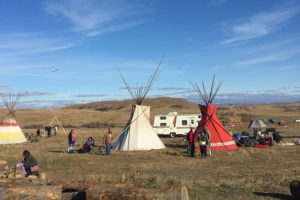Graduate Students Join Fight for Justice at Standing Rock
11/7/2016
Riverdale, N.Y.—Before coming to Mount Saint Vincent to pursue their master’s degrees in International Development and Service (IDS), Adria Anderson and Nikki Bogan had never been part of a formal protest. That changed last month when the students arrived at Standing Rock Indian Reservation, settling at Oceti Sakowin Camp, to object to the implementation of the North Dakota Oil Pipeline, a $3.7 billion, 1,170-mile pipeline planned to carry crude oil from western North Dakota to Illinois. Its proposed route runs less than half a mile north of Standing Rock and would go under the Missouri River. Protesters argue that the pipeline—which they dub ‘the black snake,’—threatens ancestral lands of deep cultural and historic importance, including burial grounds, and, in the event of a leak or spill, a vital source of drinking water. In fact, the protesters prefer to call themselves “water protectors,” committed to preserving the sanctity of their supply.
 “We had learned about Standing Rock through an indigenous people’s celebration we’d attended Columbus Day weekend,” Adria said. “We knew that [the water protectors] were not being treated well and wanted to learn more and help.” Since protests began in August, up to an estimated 15,000 people have come to pledge their support, including scores of American Indian tribes.
“We had learned about Standing Rock through an indigenous people’s celebration we’d attended Columbus Day weekend,” Adria said. “We knew that [the water protectors] were not being treated well and wanted to learn more and help.” Since protests began in August, up to an estimated 15,000 people have come to pledge their support, including scores of American Indian tribes.
Nikki is a former Peace Corps volunteer who focused her work on youth development in Peru. Stationed in a rural community, she quickly learned about the necessity of access to clean drinking water. “The family I stayed with was relatively poor and had access to water twice a week,” she said.
After discussing the possibility of joining the Standing Rock movement with Mount friends and professors, the women were buoyed by the level of support they received. Then Kat Cancio of IPSL, Mount Saint Vincent’s IDS program partner, encouraged Adria and Nikki to make the trip. “We made our [final] decision within thirty minutes,” Adria said.
The students received blankets from the College’s Campus Ministry services and a donation from Stop the Algonquin Pipeline Expansion (SAPE), an organization dedicated to preventing the expansion of Spectra Energy’s Algonquin Incremental Market (AIM) pipeline, currently under construction approximately 100 feet from critical infrastructure at the Indian Point nuclear power plant in Buchanan, New York. Buchanan is less than 50 miles from New York City. SAPE purports that a leak or spill could cause catastrophic damage to the Tri-State area and beyond.
Next, Nikki and Adria purchased heavy coats and additional blankets as well as canned goods and firewood before driving nearly three days to Standing Rock. “We had a lot of support along the way,” Nikki said, noting that the two usually slept at friends’ homes at night.
Because of recent arrests, when the students arrived at Standing Rock, the camps were temporarily on lockdown. Once inside Standing Rock, Nikki and Adria brought their items to the donation center, describing their reception as “friendly” and welcoming. They were given a tour by Lakota tribesmen Jerry Allan-Clown and Severt Young Bear, Jr. Much of the students’ time was spent in the soup kitchen keeping everyone fed. They said they witnessed prayer and peaceful protest, each participant abiding by a strict no-gun rule. A sacred fire purportedly burning for weeks was continually fed. Nikki and Adria also worked with artists to produce protest signage.
An Oregon native, Nikki said that her involvement in Standing Rock reinforced her belief in the sacredness of nature. “I strive to incorporate that belief in everything I do,” she said.
As a city native who spent a decade living in Washington, D.C., Adria noted she was surprised by the breadth of America’s ample rural areas. “It was also my first time camping,” she said.
Back at the Mount, Nikki and Adria hosted an event on November 17 designed to raise awareness about the North Dakota Oil Pipeline and regional concerns closer to home, such as the AIM pipeline and the proposed Hudson River Anchorage proposal, in which the U.S. Coast Guard is considering establishing 10 new anchorage grounds—that is, over 40 oil barges—on the Hudson River from Yonkers to Kingston, New York. Planned speakers include SAPE organizer Susan Van Dolsen and The Peace Poets, a collective of spoken word artists based in the Bronx.
For more information, contact Adria at aanderson03.student@mountaintvincent.edu or Nikki at lbogan.student@mountsaintvincent.edu.
About the University of Mount Saint Vincent
Founded in 1847 by the Sisters of Charity, the University of Mount Saint Vincent offers nationally recognized liberal arts education and a select array of professional fields of study on a landmark campus overlooking the Hudson River. Committed to the education of the whole person, and enriched by the unparalleled cultural, educational and career opportunities of New York City, the College equips students with the knowledge, skills and experiences necessary for lives of achievement, professional accomplishment and leadership in the 21st century.
